- Government of Montenegro
Press release from the 33rd Cabinet session
Press release from the 33rd Cabinet session

At today’s 33rd session, chaired by Prime Minister Milojko Spajić, the Montenegrin Cabinet adopted the Anti-Corruption Strategy for 2024-2028, accompanied by an Action Plan for 2024-2025 and a Report on the conducted public debate. The document is based on three strategic goals that align with the vision and overall aim of the Strategy, directly linked to the interim benchmarks in negotiation chapters 23 and 24, and the necessity of their fulfillment.
Strategic goal 1 focuses on the prevention of corruption and includes operational objectives such as:
- Improving the normative framework for preventing corruption,
- Strengthening the administrative and institutional framework for preventing corruption,
- Merit-based employment and advancement within government bodies,
- Transparency and free access to information, and
- Enhancing capacities for implementing anti-corruption measures in high-risk areas.
Strategic goal 2 addresses the fight against corruption, with operational objectives to:
- Improve legislation in the fight against corruption, and
- Enhance the capacities of institutions responsible for combating corruption.
Strategic goal 3 pertains to national and international cooperation in preventing and fighting corruption, raising awareness, and communication with the public.
Given the specificity of the Strategy's development, each goal includes identified risks and needs in high-risk areas to better understand the proposed measures' relevance. The strategic goals will be realized through 10 operational objectives, considering the progress made during the previous strategic document's implementation period and current challenges. The goals were defined based on recommendations from relevant international reports and organisations, obligations outlined in Montenegro’s Programme of Accession to the European union 2023-2024, the National Strategy for Sustainable Development by 2030, among others. Furthermore, the Strategy is aligned with relevant international standards and other instruments in this field, including the EU acquis communautaire.
Particular attention is given to areas with a high risk of corruption, such as the judiciary, police and customs, environment, urban planning, public procurement, local self-government, and state or municipally owned enterprises. This comprehensive strategy applies to all legislative, judicial, and executive branches at both state and local levels, including state administration bodies, independent bodies, regulatory authorities, public institutions, public enterprises, and other legal entities exercising public powers.
During the discussion, it was noted that successful implementation of the Anti-Corruption Strategy will result in greater security for the citizens of Montenegro, improved economic conditions, and increased public trust in state institutions.
The Strategy serves as a framework for developing action plans, specifying objectives, measures, responsible parties, timelines, and performance indicators, all in accordance with EU and Council of Europe recommendations and those of other international partners.
